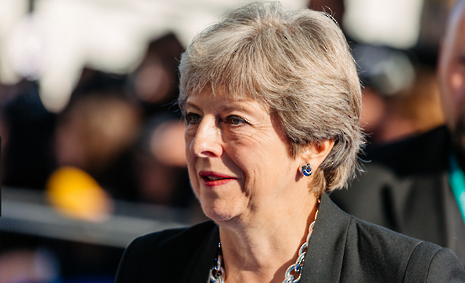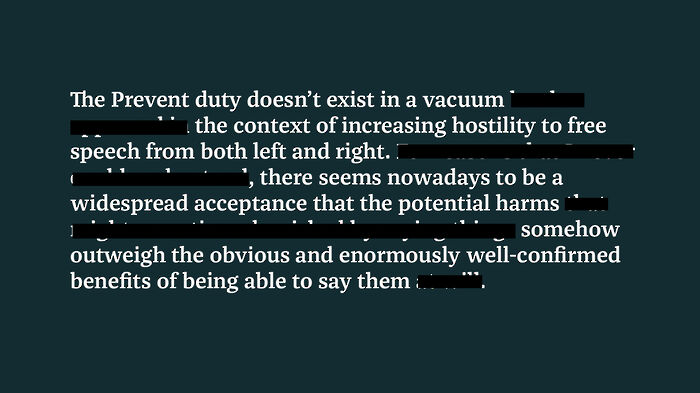May’s failure as PM should not overshadow her chilling track record as Home Secretary

It’s finally happened - Theresa May has announced her resignation. It’s been a question of when rather than whether for some time now, and we now know the answer is the 7th of June. Her tenure as Prime Minister will not be remembered fondly by anyone except a handful of loyalists. However I think it would be a mistake for the image of Theresa May we give to history to be exclusively that of a weak and inept prime minister, unable to control her MPs or even her cabinet. May spent twice as much time as Home Secretary as as Prime Minister, and her time at the Home Office was characterised not by the weakness we now identify her with, but by the successful pushing of her agenda and one of the most significant erosions of British civil liberties in recent times.
It was May who introduced the Counter-Terrorism and Security Act 2015, which made the Prevent duty, with its marked chilling effect on academic freedoms and speech, legally mandatory. A report by the Open Society Justice Initiative has said that, due to its structural flaws, Prevent “creates a systemic risk of human rights violations”: the incredibly broad definition of ‘extremism’ has led to the targeting of lawful speech and the ‘othering’ of Muslims, who are the group most targeted by the strategy. More generally May’s respect for free speech - arguably the most valuable liberty of all - is deeply questionable. Leaked cabinet correspondence showed that May had a desire to have government regulators vet all British television broadcasts in the name of “counter-extremism”, which would have given the state the right to decide what broadcasts were and weren’t ‘acceptable’ before they even went on air.
"If the actions May took as oversaw an erosion of the freedoms and rights of British citizens, then it the freedoms of immigrants were positively demolished"
When Edward Snowden revealed the unlawful mass violations of privacy that intelligence services were guilty of, the Home Secretary had a duty to the citizens to make the operations of state surveillance more transparent and to limit its scope. Instead, May’s “Snoopers’ Charter” simply legalised the practices Snowden exposed and introduced even more powers to violate our basic freedoms. The Investigatory Powers Act lets police and intelligence agencies access and control your phone and computer; forces service providers to provide indiscriminate records of emails, phone calls and texts, and internet histories; gives license to bulk interception of our private communications; and all this without even requiring any suspicion of a crime. Freedom of speech and of the press; the legitimacy of fair trials and trust in legal professional privilege; our right to organise, associate and protest have all been undermined by this law. It seems May was so enamoured with eroding privacy she didn’t know when to stop: the Act licenses even the Food Standards Agency to access your internet history without a warrant.
Private liberty was also threatened under May’s Home Office. Her biggest move was banning all ‘psychoactive substances’ with the Psychoactive Substances Act 2016. The wording of the Act is so wide-ranging that, without specific exceptions, the law would have banned wine and coffee, and the Catholic Church needed special reassurance that it would be allowed to use incense in services. Most notably, alkyl nitrites (a.k.a. poppers) were banned, despite their incredibly low-risk status, with the government being accused of specifically targeting queer men in an ‘attack on pleasure’.
If the actions May took as Home Secretary saw an erosion of the freedoms and rights of British citizens, then the freedoms of immigrants were positively demolished. The phrase ‘hostile environment’ is by now in the public vocabulary, with May’s immigration policy accused of being the catalyst for the Windrush scandal. But its full, morally disgusting implications are still lesser-known. Before 2017, hundreds if not thousands of EEA citizens, with every right to live in this country, were forcibly deported for rough sleeping. Immigrant mothers have been told that their children would be taken from them in an attempt to bully them into leaving the country. Employers, landlords, schools, the NHS, and others have been forced to do the job of border guards and police immigration, making society hostile at every level: 44% of landlords have admitted to be less likely to rent to someone who even ‘appears’ to be an immigrant. This is in large part because of the legal threat placed upon them if they rent to someone the Home Office disapprove of. As a result, immigrants are scared out of civil society by the daily implication that they are not welcome.
"Violations of freedom affect us all, but not equally. Those who are most at risk of state violence and overreach are those who need civil liberties the most"
Violations of freedom affect us all, but not equally. Those who are most at risk of state violence and overreach are those who need civil liberties the most, and to whom the most harm is done by their erosion. It is Muslims whose speech is being constantly monitored under Prevent; it is queer men, not wider society, whose drugs have been banned; it is immigrants who cannot access NHS services. The discriminatory aspects of these policies aren't just incidental: they come about as the powerful majority is willing to license the sacrifice of freedoms they don’t feel they need. It is not mentioned often enough that Prevent does not apply to the only part of the UK that actually has been subject to continuous terror campaigns, and where former and present members of extremist organisations continue to exert powerful influence in public life - Northern Ireland. Did the government just forget about the Troubles? Or was the racialisation of the policy, the targeting of Muslims, part-and-parcel of it from the very start? A loss of freedom will tend to enhance inequalities and further oppress the worst-off in society.
May’s record is suggestive of a vision of civil liberties as bonuses - things the government gives the citizens but can be revoked at any time. On this view, the fundamental rights of the citizen are optional gifts, not the foundations of any just relationship between the state and those it is supposed to serve. This attitude is prevalent throughout the Conservative Party - May’s old boss, David Cameron, famously disparaged the idea that “as long as you obey the law, we [the state] will leave you alone” - and has put our most basic liberties at risk. We must not let May’s record in Downing Street overshadow her record at Marsham Street, and we must all fight to retake and defend the freedoms that a genuinely open and liberal society requires.
 News / Colleges charge different rents for the same Castle Street accommodation2 March 2026
News / Colleges charge different rents for the same Castle Street accommodation2 March 2026 News / News in Brief: waterworks, wine woes, and workplace wins 1 March 2026
News / News in Brief: waterworks, wine woes, and workplace wins 1 March 2026 News / Angela Merkel among Cambridge honorary degree nominees27 February 2026
News / Angela Merkel among Cambridge honorary degree nominees27 February 2026 News / Climate activists protest for ‘ethical careers policy’1 March 2026
News / Climate activists protest for ‘ethical careers policy’1 March 2026 News / King’s hosts open iftar for Ramadan3 March 2026
News / King’s hosts open iftar for Ramadan3 March 2026









